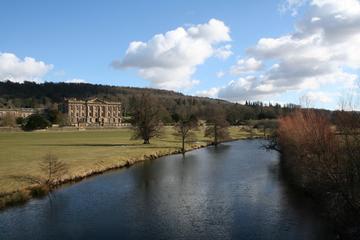Digital Engagement with Archives Micro-internship
With Chatsworth House Trust

Chatsworth Park. Photography by Flickr user Tom Herbert (CC BY-SA 2.0)
Oxford University students are warmly invited to undertake a remote micro-internship with Chatsworth House Trust in late June-early July 2022. This micro-internship was brokered by the Heritage Parterships Team and organised through the Careers Service Micro-Internship Programme.
Chatsworth House Trust is a charity dedicated to the long-term preservation of Chatsworth House, its art collection, archives, library, garden and park for the benefit of the public. The Devonshire Collection Archives at Chatsworth are one of the largest privately-held archives in the UK, documenting one of the country’s most important aristocratic dynasties – the Cavendish family, Dukes of Devonshire. Through our new partnership with Google Arts & Culture, we are developing online exhibitions to be delivered to an international audience via the Google Arts and Culture platform alongside some of the world’s most important heritage and cultural institutions. Our current internships offer the opportunity to contribute to online exhibitions focusing on two significant 17th-century archival documents.
Before the official launch of the Chatsworth pages on Google Arts & Culture, we need to prepare a substantial collection of images and interpretation, along with a collection of ‘stories’ (online exhibitions). We have already made significant headway with this work, thanks to one Oxford summer internship in 2021 and the ongoing efforts of staff in the Collections Department. However, we are seeking to build further on this foundation ready for our initial launch, and as one of four interns you will develop content for two Google Arts and Culture stories. These will focus on two significant archival documents we are in the process of having conserved thanks to funding from the National Manuscripts Conservation Trust and the Golden Bottle Trust. The documents reflect the political influence of the Cavendish family in the UK, as well as the significance of the related Boyle family in the history of Ireland.
We are seeking four interns to work over a five-day period on developing content around the following documents:
- An illuminated letters patent issued by William and Mary under the Great Seal, granting the Dukedom of Devonshire to William Cavendish, 4th Earl of Devonshire (1640-1707), in 1694 in recognition of his role in the Glorious Revolution.
- An impressive 4.5-metre long illuminated pedigree drawn up in 1626 for Richard Boyle, 1st Earl of Cork (1566-1643), politician and administrator, and a controversial figure in the history of early modern Ireland, whose family later married into the Cavendish line.
We envisage two interns working on each document, although we hope that all four interns will share ideas and discuss the development of their briefs.
The interns will be provided with high resolution images of both documents, and other digital resources as necessary. They will:
- Produce general background notes on each document which we can use in our archival catalogue records, e.g. creators, dates, key individuals, content, context.
- Identify some key themes to focus on in each story.
- Write some short narrative interpretation to accompany specific images taken from the documents; the archivist will subsequently incorporate this into two exhibitions using the Google Arts & Culture Story Editor.
- For each individual image, produce some basic interpretation which will enable the image to sit as an independent item in our Google Arts & Culture gallery.
- Update Chatsworth’s Further Reading list with any useful publications found during the course of their research.
Our interns will be supervised by Fran Baker, Archivist & Librarian, with Aidan Haley, Assistant Archivist & Librarian as co-supervisor. There will be a kick-off meeting at the very start of the week, a wrap-up with presentation of project outputs on Friday afternoon, and a morning catch-up on the other days as well as regular email contact.
At the end of the project, the interns will have produced a suite of individual images with appropriate interpretation which will subsequently be uploaded to Chatsworth’s Google Arts & Culture gallery page. They will also produce the substantial part of two Google Arts and Culture ‘stories’; the archivist will add some interpretation about the conservation project to these narratives, and upload them to Chatsworth’s pages using Google Arts & Culture’s Story Editor. The interns will be publicly credited by name at the end of each story, and the stories will be published online when Chatsworth’s Google Arts & Culture pages are officially launched.
We are looking for interns with the following skills and experience:
Essential:
- Demonstrable interest in, or experience of researching, early modern British or Irish history.
- Ability to write engagingly for a general audience.
- An ability to work collaboratively as part of a small team.
- Excellent IT skills.
Desirable:
- Experience of working with family and estate archives, or individual archival documents, from the early modern period.
- Familiarity with the Google Arts and Culture platform.
- We envisage sharing image files and content using Google Drive, so having a Google account would be an advantage.
Year of study: Postgraduate Research (MPhil/DPhil/PhD)
Further details & how to apply
Application closing date: Monday 9 May, 2022, midday.
Reference ID: 2JA9M
Monday 27 June – Friday 1 July 2022. Please note that the Employer is unable to accommodate another week.
Students are required to commit to the full micro-internship - as with any professional placement - and any concerns about dates should be raised with the Internship Office in advance of making an application.
For more information and to apply, visit the Careers Service website.
Students are asked to provide:
- A CV
- A personal statement, explaining both why they are interested in the placement and the organisation, and why they would be well-suited to the post


